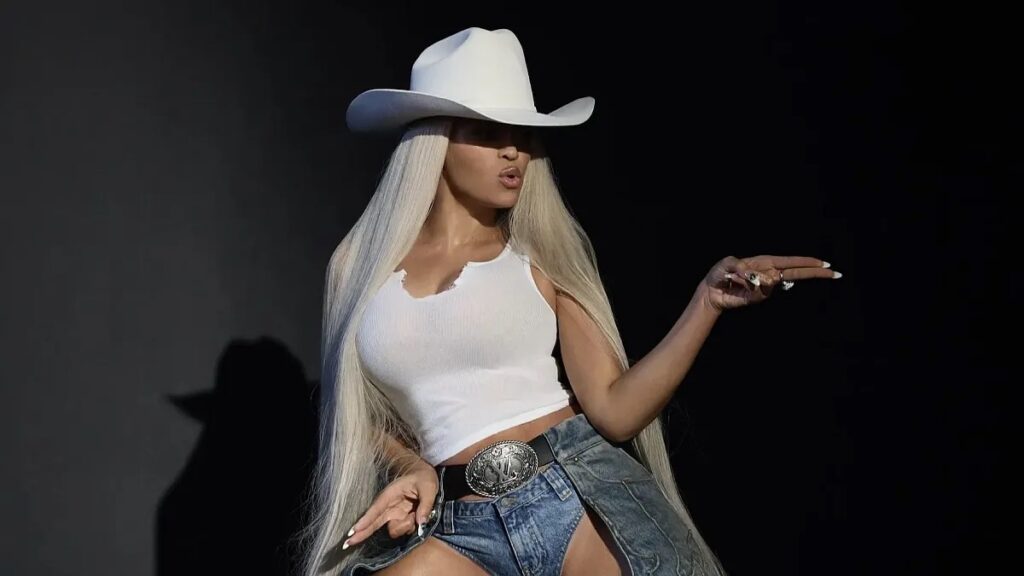In a move both shocking and completely unsurprising, the Country Music Association has failed to nominate Cowboy Carter, the landmark country music project from Beyoncé, in any of its 2024 categories. On the second part of her ongoing Renaissance project, she used the very first track to ask a pointed question: “They used to say I spoke too country/ Then the rejection came, said I wasn’t country ‘nough/ Said I wouldn’t saddle up, but if that ain’t country, tell me, what is?”
Cowboy Carter didn’t just do well; it debuted at No. 1, making Beyoncé the first Black woman to secure that slot on the Top Country Albums chart, too. Dolly Parton and Willie Nelson appear on the album. The LP, while genre-blending, is deeply heartfelt, personal in a way that feels urgent and refreshing.
Beyoncé also didn’t hold back in terms of speaking about her mindset around the project. Cowboy Carter isn’t about just one thing, as she pulled inspiration from her own life and background, stories about her family, her home of Houston and its connections to country and zydeco, and classic genre tracks like Dolly Parton’s “Jolene.” But Cowboy Carter was also conceived in response to Beyoncé’s experience at the 2016 CMA Awards, which she called “an experience that I had years ago where I did not feel welcomed…and it was very clear that I wasn’t.” She continued, “My hope is that years from now, the mention of an artist’s race, as it relates to releasing genres of music, will be irrelevant.”
For now, though, it still feels unfortunately relevant. Beyoncé making the genre shift was lauded, but still not enough for the voting body of the Country Music Association, which is made up of a mix of industry professionals. Somehow, though, Post Malone’s leap into country with his 2024 album, F-1 Trillion, was sufficient; the rapper woke up to four nominations, including one for his chart-topping duet with controversial figure Morgan Wallen, “I Had Some Help.” Wallen, who was captured on video three years ago shouting racial slurs, leads this year’s nominations with seven nods.
Like many other organizations, the CMAs are proudly touting their “commitment to inclusivity” on their website with a statement that claims a vague dedication “to creating lasting change by nurturing an inclusive and equitable culture.” Interspersed with photos of BRELAND, Maren Morris, and Brandi Carlile, they say, “We celebrate the dedication of our staff, our membership and the industry in moving Country Music forward and are committed to offering education and resources to help ensure an equitable pipeline of opportunity that continues for years to come.”
The CMAs did manage to toss two nominations to “A Bar Song (Tipsy)” singer Shaboozey, who is featured on Cowboy Carter track “SWEET HONEY BUCKIN’,” but he made sure to redirect the conversation. “Thank you Beyoncé for opening a door for us, starting a conversation, and giving us one of the most innovative country albums of all time!” he said on Twitter in response to the nods. The Country Music Association and Beyoncé’s Parkwood Entertainment were both contacted for comment.
The CMAs’ reaction to Cowboy Carter — or, more appropriately, the lack thereof — feels more largely emblematic of the glacial pace at which Nashville organizations like this tend to move. Over a decade has passed since “Tomato-gate,” when a Nashville radio executive characterized the men as the lettuce of the salad and women as the tomatoes in terms of his preferred radio distribution, and still, so very little has changed. Marissa Moss, author of Her Country: How the Women of Country Music Became the Success They Were Never Supposed to Be, recently expressed her disappointment around the drastic radio freefall happening with a new song from Lainey Wilson. “This is such a fun single and Lainey is amazing, but Music Row makes money on dudes and it will be that way until the end of time without fundamental change,” she observed. “One woman at a time, with the hourglass runnin’.”
This May, Lainey Wilson was named Entertainer of the Year at the Academy of Country Music Awards, the most prestigious award of the night. If even one of Nashville’s darlings can’t hold on to radio play, what hope do emerging women have? What hope do emerging women of color, or queer artists breaking into country music have? If Beyoncé can’t lock in a CMA Nomination, who can?
Despite what these types of gatekeepers would have us believe, Nashville’s music scene, and even its country scene, are far more varied and colorful than many people expect, and not every organization is dragging its feet like the CMAs. Consider CMT (Country Music Television), who, this month, hosted an Equal Access showcase spotlighting eight excellent artists, all of whom happened to be part of the LGBTQ+ community. Almost all of the acts onstage throughout the night were also people of color. The event was co-hosted by Black country artist Mickey Guyton and CMT’s Leslie Fram, both longtime advocates for the Equal Access program. One of the performers, Carmen Dianne, got emotional when she recalled seeing Guyton perform the National Anthem at a Tennessee Titans game many years ago. “Look, there’s a Black girl doing country music,” her mother had said to her; she remembers the moment as a turning point that informed what she wanted to do with her life.
The reception to Cowboy Carter was joyful, and nights like CMT’s Equal Access showcase make it feel like anything is possible in country music. People are ready to embrace things that might look a little different from their norm. Y’all means all, and organizations like the one behind the CMAs need to embrace this, or they’re going to be left in the dust soon enough as this gap between voting bodies and the general public widens.
“Can we stand for something?” Beyoncé asked on “American Requiem.” It’s time for the people in power in country music to make up their minds and answer the question.

